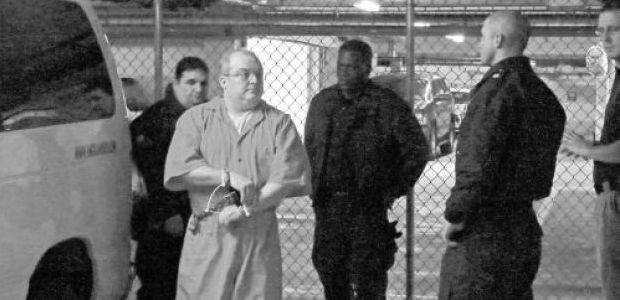Terrebonne seeks paddling grant after cycle trail rejected
April 22, 2015
Houma police officer top cop in Louisiana
April 28, 2015For many who remember the scars convicted killer and rapist Chad Roy Louviere’s actions left not only on his victims and their families but Terrebonne Parish and surrounding communities, the former deputy’s acceptance of two consecutive life sentences – striking the death penalty imposed by a jury –is a difficult pill to swallow.
But for survivors of the 25-hour 1996 standoff at the former ArgentBank on Grand Caillou Road, the family of 27-year-old Pamela Ann Duplantis and the victim of a vicious crime Louviere committed prior to storming the bank, the choice was either acceding to a deal or facing other potential pain.
Louviere’s post-conviction relief bid, already played out over fifteen months in Judge Johnny Walker’s cramped courtroom, authorities say, would likely have resulted in further appeals and, perhaps, the ordeal of a trial.
“I do not want to go through the legal proceedings anymore,” were words placed in the record on behalf of the woman a uniformed Louviere pulled over with his marked patrol unit on Bull Run Road, pepper-sprayed, handcuffed, drove to a cane field and then raped, before speeding to the bank where his estranged wife worked. “I do not care to bring it up anymore.”
The Times is not identifying that woman, because of the nature of the attack and a desire not to further re-victimize her.
Her victim impact statement was read aloud in court Tuesday by Assistant District Attorney Ellen Doskey, who has fought Louviere’s new trial bid.
Doskey’s voice close to cracking at times.
In her statement the woman said the ordeal continues to haunt, and has made trusting the police impossible. Her own son, the statement reads, is now in law enforcement, and has helped somewhat, but not enough.
Louviere has been on death row within the Louisiana State Penitentiary at Angola, in relative isolation.
But isolation is not what the woman wants for him, now that he will be spending life behind bars, free of the lethal injection needle’s threat.
“Chad Louviere should be in jail for life,” the statement continues. “In general population, with no consideration for the fact that he is a former law enforcement officer.”
MULTIPLE ALLEGATIONS
Louviere’s final appearance ended a case that was years in the making.
The former deputy was sentenced in 2000 to die, after entering guilty pleas to aggravated rape and first-degree murder. He waived a trial on the advice of former defense counsel David Stone and proceedings went immediately to the sentencing phase.
The sentence was appealed but failed in higher courts. In 2008 attorneys first filed a petition for post-conviction relief, but the attempt foundered due to shortages in the state system that pays for such actions.
When attorneys finally got a green light they raised numerous objections to prior proceedings, with Louviere getting his day in court before Walker in 2013.
Louviere’s attorneys allege that he was not competent to enter a guilty plea to first-degree murder before Judge Edward J. Gaidry, in 1999, and that his attorneys at the time gave bad advice. The record shows that attorneys never sought a competency hearing; the defense team now says that Louviere’s original lawyers should have been able to argue that he did not intentionally shoot Duplantis, and that even if he did, Louviere was not sane at the time the crime was committed.
Various witnesses, the attorneys allege in legal filings, were not called to testify to Louviere’s state of mind. Doctors who might have given strong testimony about Louviere’s mental state were never heard from.
One element Judge Walker would have had to decide, if the most recent case continued, was whether David Stone threw Louviere under the legal bus out of incompetence or apathy, or whether the attorney had actually crafted a strategy centering on hopes that a jury might see a guilty plea to a capital charge as a form of remorse.
CAREFUL QUESTIONING
As victims and their families waited for Tuesday’s proceeding to begin the courtroom was bathed in silence. Louviere, wearing an orange prison jumpsuit, hands and feet shackled, regarded the scene impassively. In a far corner of the courtroom Duplantis’ parents and daughter stared hard at the bespectacled convict.
Assistant District Attorney Carlos Lazarus addressed the court, informing Walker on the record that with the consent and acknowledgement of the victims and families, Louviere had withdrawn his application for relief, in return for a plea of guilty to two consecutive life sentences, one for aggravated rape and the other for murder.
The sentences, Lazarus said, would run consecutively “without benefit of probation, parole or suspended sentence.”
Caroline Tillman, Michael Admirand and Sarah Ottinger of the New Orleans-based Capital Appeals Project appeared on behalf of Louveire; Tillman affirmed that Louviere’s team had accepted the deal.
After Louviere was sworn in Walker went over the agreement step by step.
Did he understand that he was giving up the rights to future court actions on the matter? Did he understand that he was giving up the right to appeal decisions that were unfavorable to him?
In a strong voice, Louviere answered “yes” and “yes sir” to Walker’s many questions.
The attorneys also confirmed that an examination by forensic psychiatrist George Woods determined Louviere was competent to choose an end to the case and to accept the life sentences that would be imposed.
Louviere’s attorneys gave assurances as well that their client was able to make a sound decision. His mother, father and sister, seated in a different spot in the courtroom from the victims and their families, paid rapt attention to the proceedings; the only emotion the killer showed was when he managed a quick nod to them, as state prison guards guided him to a courtroom exit, for the trip back to Angola.
TEARFUL FAREWELLS
With the proceedings complete, members of the Duplantis family and other victims shared tearful embraces.
“I would never have agreed to this if the victims had not accepted,” Terrebonne Parish District Attorney Joe Waitz Jr. said prior to the hearing, recounting the discussions that ultimately left the decision in their hands. Their responses, he said, were collected after six weeks had passed.
A major factor in the decision by prosecutors to forego the fight was testimony given last year by a psychiatrist, Dorothy Lewis, that she had examined Louviere prior to his 1998 guilty plea.
“This psychiatrist testified that that she had examined Louviere in 1998 and had diagnosed him with bi-polar mental disorder,” reads a statement issued by Assistant District Attorney Carlos Lazarus. “She believed he was suffering from a manic psychotic episode on Oct. 17, 1996.”
The pleadings by his current attorneys say that trial counsel never informed Louviere of the diagnosis and “failed to consider this information appropriately before advising him to enter a plea of guilty.”
Lazarus’ statement echoed the sentiments expressed by Waitz about victim input prior to the deal being formalized.
“All the victims and their families have agreed that this agreement is best to bring closure to these tragic events and to ensure that Louviere has virtually no chance of being released from prison,” reads the statement, issued after the hearing.
PRAYERS OFFERED
Members of Louviere’s legal team spoke briefly when proceedings were concluded.
“Our thoughts and prayers are with the survivors, their families and the many other community members affected by this horrible crime,” attorney Michael Admirand
“It has been a long and difficult process, one that has highlighted the importance of recognizing and addressing the mental health issues of people in our communities, by assuring that we provide adequate services and support for those in need of help.”
An official at Angola reached Wednesday said there is no specific requirement that former police officers or anyone else be segregated from the general inmate population.
There is a requirement, the official said, that the public at large as well as inmates be kept safe. Now that he is vacating the prison’s death row he will have to undergo a classification process, and so there is no way of knowing yet where he will be housed.
Chad Louviere is escorted into the Houma-Terrebonne Courthouse in this file photo. Testimony continued Tuesday as Louviere’s attorneys argue for post-conviction relief before District Judge John Walker.













